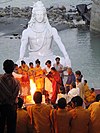Dharma (/?d??rm?/; Sanskrit: ????, translit. dharma, pronounced (![]() listen); Pali: ????, translit. dhamma, translit. dhamma) is a key concept with multiple meanings in the Indian religions – Hinduism, Buddhism, Jainism, and Sikhism. There is no single-word translation for dharma in Western languages.
listen); Pali: ????, translit. dhamma, translit. dhamma) is a key concept with multiple meanings in the Indian religions – Hinduism, Buddhism, Jainism, and Sikhism. There is no single-word translation for dharma in Western languages.
In Hinduism, dharma signifies behaviours that are considered to be in accord with ?ta, the order that makes life and universe possible, and includes duties, rights, laws, conduct, virtues and "right way of living". In Buddhism, dharma means "cosmic law and order", and is also applied to the teachings of the Buddha. In Buddhist philosophy, dhamma/dharma is also the term for "phenomena". Dharma in Jainism refers to the teachings of tirthankara (Jina) and the body of doctrine pertaining to the purification and moral transformation of human beings. For Sikhs, the word dharm means the path of righteousness and proper religious practice.
The word dharma was already in use in the historical Vedic religion, and its meaning and conceptual scope has evolved over several millennia. The antonym of dharma is adharma.
Contents
Etymology
The Classical Sanskrit noun dharma is a derivation from the root dh?, which means "to hold, maintain, keep", and takes a meaning of "what is established or firm", and hence "law". It is derived from an older Vedic Sanskrit n-stem dharman-, with a literal meaning of "bearer, supporter", in a religious sense conceived as an aspect of Rta.
In the Rigveda, the word appears as an n-stem, dhárman-, with a range of meanings encompassing "something established or firm" (in the literal sense of prods or poles). Figuratively, it means "sustainer" and "supporter" (of deities). It is semantically similar to the Greek Themis ("fixed decree, statute, law"). In Classical Sanskrit, the noun becomes thematic: dharma-.
The word dharma derives from Proto-Indo-European root
- d?er- ("to hold"), which in Sanskrit is reflected as class-1 root ?dh?. Etymologically it is related to Avestan ?dar- ("to hold"), Latin firmus ("steadfast, stable, powerful"), Lithuanian der??ti ("to be suited, fit"), Lithuanian derm? ("agreement") and darna ("harmony") and Old Church Slavonic dr?žati ("to hold, possess").
- Classical Sanskrit word dharmas would formally match with Latin o-stem firmus from Proto-Indo-European d?er-mo-s "holding", were it not for its historical development from earlier Rigvedic n-stem.
In Classical Sanskrit, and in the Vedic Sanskrit of the Atharvaveda, the stem is thematic: dhárma- (Devan?gar?: ????). In P?li, it is rendered dhamma. In some contemporary Indian languages and dialects it alternatively occurs as dharm.
Definition
Dharma is a concept of central importance in Indian philosophy and religion. It has multiple meanings in Hinduism, Buddhism, and Jainism. It is difficult to provide a single concise definition for dharma, as the word has a long and varied history and straddles a complex set of meanings and interpretations. There is no equivalent single word translation for dharma in western languages.
There have been numerous, conflicting attempts to translate ancient Sanskrit literature with the word dharma into German, English and French. The concept, claims Paul Horsch, has caused exceptional difficulties for modern commentators and translators. For example, while Grassmann's translation of Rig-veda identifies seven different meanings of dharma, Karl Friedrich Geldner in his translation of the Rig-veda employs 20 different translations for dharma, including meanings such as 'law', 'order', 'duty', 'custom', 'quality', and 'model', among others.
The root of the word dharma is "dhri", which means "to support, hold, or bear". It is the thing that regulates the course of change by not participating in change, but that principle which remains constant. Monier-Williams, the widely cited resource for definitions and explanation of Sanskrit words and concepts of Hinduism, offers numerous definitions of the word dharma: such as that which is established or firm, steadfast decree, statute, law, practice, custom, duty, right, justice, virtue, morality, ethics, religion, religious merit, good works, nature, character, quality, property. Yet, each of these definitions is incomplete, while combination of these translations do not convey the total sense of the word. In common parlance, dharma means "right way of living" and "path of rightness".
The meaning of the word dharma depends on the context, and its meaning has evolved as ideas of Hinduism have developed through history. In the earliest texts and ancient myths of Hinduism, dharma meant cosmic law, the rules that created the universe from chaos, as well as rituals; in later Vedas, Upanishads, Puranas and the Epics, the meaning became refined, richer, and more complex, and the word was applied to diverse contexts. In certain contexts, dharma designates human behaviours considered necessary for order of things in the universe, principles that prevent chaos, behaviours and action necessary to all life in nature, society, family as well as at the individual level. Dharma encompasses ideas such as duty, rights, character, vocation, religion, customs and all behaviour considered appropriate, correct or morally upright.
The antonym of dharma is adharma (Sanskrit: ?????), meaning that which is "not dharma". As with dharma, the word adharma includes and implies many ideas; in common parlance, adharma means that which is against nature, immoral, unethical, wrong or unlawful.
In Buddhism, dharma incorporates the teachings and doctrines of the founder of Buddhism, the Buddha.
History
According to the authoritative book History of Dharmasastra, in the hymns of the Rigveda the word dharma appears at least fifty-six times, as an adjective or noun. According to Paul Horsch, the word dharma has its origin in the myths of Vedic Hinduism. The Brahman (whom all the gods make up), claim the hymns of the Rig Veda, created the universe from chaos, they hold (dhar-) the earth and sun and stars apart, they support (dhar-) the sky away and distinct from earth, and they stabilise (dhar-) the quaking mountains and plains. The gods, mainly Indra, then deliver and hold order from disorder, harmony from chaos, stability from instability – actions recited in the Veda with the root of word dharma. In hymns composed after the mythological verses, the word dharma takes expanded meaning as a cosmic principle and appears in verses independent of gods. It evolves into a concept, claims Paul Horsch, that has a dynamic functional sense in Atharvaveda for example, where it becomes the cosmic law that links cause and effect through a subject. Dharma, in these ancient texts, also takes a ritual meaning. The ritual is connected to the cosmic, and "dharmani" is equated to ceremonial devotion to the principles that gods used to create order from disorder, the world from chaos. Past the ritual and cosmic sense of dharma that link the current world to mythical universe, the concept extends to ethical-social sense that links human beings to each other and to other life forms. It is here that dharma as a concept of law emerges in Hinduism.
Dharma and related words are found in the oldest Vedic literature of Hinduism, in later Vedas, Upanishads, Puranas, and the Epics; the word dharma also plays a central role in the literature of other Indian religions founded later, such as Buddhism and Jainism. According to Brereton, Dharman occurs 63 times in Rig-veda; in addition, words related to Dharman also appear in Rig-veda, for example once as dharmakrt, 6 times as satyadharman, and once as dharmavant, 4 times as dharman and twice as dhariman. There is no Iranian equivalent in old Persian for dharma, suggesting the word dharman had origins in Indo-Aryan culture outside of Persia, or it is a concept that is indigenous to India. However, ideas in parts overlapping to Dharma are found in other ancient cultures: such as Chinese Tao, Egyptian Maat, Sumerian Me.
Eusebeia and dharma
In mid-20th century, an inscription of the Indian Emperor Asoka from the year 258 BC was discovered in Afghanistan. This rock inscription contained Sanskrit, Aramaic and Greek text. According to Paul H
Watch movie Dharm online on Amazon
Watch movie Dharm online
Watch The Movie On PrimeLucky: No Time For Love Full HD Movie Download

Sangeet Full HD Movie Download

Daasi Full HD Movie Download

Banjaran Full HD Movie Download

Do Ustaad Full HD Movie Download

Singhasan Full HD Movie Download

Prince (1969) Full HD Movie Download
.jpg)
Namak Haram Full HD Movie Download

Ghar Parivar Full HD Movie Download

Gulam Begum Badshah Full HD Movie Download

Baaz: A Bird in Danger Full HD Movie Download

Kudrat (1998) Full HD Movie Download
.jpg)
Allari Alludu Full HD Movie Download

Eradane Maduve Full HD Movie Download

Anbai Theadi Full HD Movie Download

Don Seenu Full HD Movie Download

Padamati Sandhya Ragam Full HD Movie Download

Sarada Saradaga Full HD Movie Download

Takkari Donga Chakkani Chukka Full HD Movie Download

Iddaru Iddare Full HD Movie Download

Ta Ra Rum Pum Full HD Movie Download

Download latest Movie from bollywood
- 1> baaghi 3
- 2> THE SKY IS PINK MOVIE FULL STORY AND REVIEW
- 3> Luka Chuppi
- 4> TO ALL THE BOYS I’VE LOVED BEFORE
- 5> Kabir Singh
- 6> Street Dancer 3D
- 7> Simmba
- 8> Gone Girl
- 9> The Girl Who Lived
- 10> Ludo
- 11> DILWALE DULHANIA LE JAYENGE
- 12> GUILTY
- 13> The Godfather
- 14> Adventures of Rusty
- 15> Sooryavanshi
- 16> Satyameva Jayate 2
- 17> Thappad
- 18> Bhool Bhulaiyaa 2
- 19> KGFChapter 2
- 20> Mardaani 2
- 21> Pinjar
- 22> Shivaji maharaj
- 23> Ek Villian 2
- 24> Hungama 2
- 25> Divergent
- 26> Mumbai Saga
- 27> The Internship
- 28> HIT (telugu)
- 29> Panga
- 30> The perfect date
- 31> 16 December
- 32> Gopala Gopala (Telugu)
- 33> Brahmastra
- 34> Gangubai Kathiawadi
- 35> Manmadhudu
- 36> Nenu local
- 37> Mahanati
- 38> Shatamanam bavathi
- 39> Lagaan
- 40> After
- 41> MOM
- 42> Shamshera
- 43> Raguvaran BTech
- 44> Khakee
- 45> The villain
- 46> OM
- 47> Mr. perfect
- 48> Bueatifull mind
- 49> Hichki
- 50> Gabbar Singh
- 51> Jogi
- 52> Before Sunrise
- 53> Before Sunset
- 54> Before Midnight
- 55> The Big Bull
- 56> Top Gun: Maverick
- 57> The Purge
- 58> The Sky is Pink
- 59> Laxmmi Bomb
- 60> Sadak 2
- 61> Sufna
- 62> Prithviraj
- 63> PK
- 64> Coolie No 1(2020)
- 65> Black Widow
- 66> Dear Zindagi
- 67> Dil Bechara
- 68> PHIR HERA PHERI
- 69> WAR
- 70> Dostana
- 71> RRR: Roudram Ranam Rudhiram
- 72> Maidan
- 73> Dabbang 3
- 74> Chhalaang
- 75> life as we know it
- 76> SherShaah
- 77> Sandeep Aur Pinky Faraar
- 78> Event Horizon
- 79> 83
- 80> Radhe: Your Most Wanted Bhai
- 81> Gunjan Saxena: The Kargil Girl
- 82> Mr India
- 83> Vivah
- 84> Anokha Bandhan
- 85> Ghost
- 86> Bhoot: Part One - The Haunted Ship
- 87> Haseen Dilruba
- 88> Laal Singh Chaddha
- 89> Qismat
- 90> Rajput
- 91> Drive
- 92> Dil Chahta Hai
- 93> Dil Ki Baazi
- 94> Dil Ka Rishta
- 95> Teesri Manzil
- 96> Dil
- 97> Love Aaj Kal
- 98> Khaali Peeli
- 99> Bunty Aur Babli 2
- 100> Atrangi Re
- 101> Gulabo Sitabo
- 102> Jodi
- 103> Suraj Pe Mangal Bhari
- 104> Deewana
- 105> Attack
- 106> Sardar Udham Singh
- 107> Toofan
- 108> THE LOVEBIRDS
- 109> Jersey
- 110> Ginny Weds Sunny
- 111> Thalaivi
- 112> Shiddat
- 113> Angels vs Zombies
- 114> Koi Mil Gya
- 115> Thank God
- 116> Bhuj: The Pride of India
- 117> Hum Aapke Hain Kaun
- 118> The Platform
- 119> Bird Box
- 120> Roohi Afzana
- 121> Torbaaz
- 122> Nikamma
- 123> World War Z
- 124> Extraction
- 125> Train to Busan
- 126> Life of Pi
- 127> SHAADI MEIN JROOR AANA
- 128> Himmat Aur Mehnat
- 129> To All The Boys: P.S. I Still Love You
- 130> Mimi
- 131> Good Newwz
- 132> Shubh Mangal Zyada Saavdhan
- 133> Raabta
- 134> Harry Potter and the Philosopher's Stone
- 135> Harry Potter and the Chamber of Secrets
- 136> Chhapaak
- 137> War of the Worlds
- 138> Harry Potter and the Prisoner of Azkaban
- 139> Harry Potter and the Goblet of Fire
- 140> MURDER MYSTERY
- 141> Shakuntala Devi
- 142> Bachchan Pandey
- 143> Jayeshbhai Jordar
- 144> Sheer Qorma
- 145> Saina
- 146> 'O' Pushpa I hate tears
- 147> Kedarnath
- 148> MS Dhoni The Untold Story
- 149> Chhichhore
- 150> Badhaai Ho
- 151> Unstoppable
- 152> Oz the Great And Powerful
- 153> The Girl on the Train
- 154> Haathi Mere Saathi 2020
- 155> The Conjuring: The Devil Made Me Do It
- 156> Gandhi Se Pehle Gandhi
- 157> The Song of Scorpions
- 158> Srimanthudu
- 159> Hello Guru Prema Kosame
- 160> Beauty and The Beast
- 161> Black Panther
- 162> Charlie and the Chocolate Factory
- 163> Bole Chudiyan
- 164> Fidaa
- 165> Duvvada Jagannadham
- 166> Bruce Lee: The Fighter
- 167> Hyper
- 168> Yaara
- 169> Red (2020)
- 170> Shivam
- 171> That Is Mahalakshmi
- 172> Nishabdham
- 173> Aashram 2020 web series
- 174> Laxmii
- 175> Mismatched
- 176> STUDENT OF THE YEAR 2
- 177> NAIL POLISH
- 178> Ramprasad Ki Tehrvi
- 179> KAAGAZ
- 180> 12 o Clock
- 181> The Power
- 182> bolo hau
- 183> Tribhanga
- 184> JAMUN
- 185> Madam Chief Minister
- 186> Maasaab
- 187> Aadhaar
- 188> Tanhaji
- 189> Bhaagi 3
- 190> Bhootnath
- 191> MALANG
- 192> Jai Mummy Di
- 193> Haathi Mere Saathi 2021
- 194> Shakeela
- 195> Unpaused
- 196> Annayya
- 197> Vamsoddharakudu
- 198> Mrugaraju
- 199> Narasimha Naidu
- 200> Sankranti
- 201> Manasu Maata Vinadhu
- 202> Anjaane
- 203> Apaharan
- 204> Bachke Rehna Re Baba
- 205> Bewafaa
- 206> Roohi
- 207> Radhe
- 208> Zindagi Khoobsoorat Hai
- 209> Yeh Mohabbat Hai
- 210> Yeh Kya Ho Raha Hai?
- 211> The Tomorrow War
- 212> DehradunDiary
- 213> Meri Shaadi Karaoo
- 214> Matruu Ki Bijlee Ka Mandola
- 215> No One Killed Jesica
- 216> Aag Ka Goola
- 217> Eight Million Dollars
- 218> Three Hundred
- 219> Cats and Dog
- 220> Decoy
- 221> Gold Rush
- 222> You Have Got Mail
- 223> Final Destination three
- 224> Tofan
- 225> Jungle






